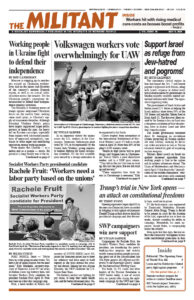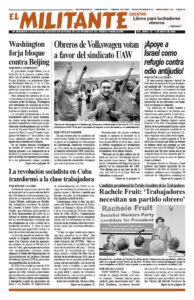May 10, 1999
SOUTH ST. PAUL, Minn. — More than 500 angry farmers from a dozen Midwestern states came to this former meatpacking center April 18 to demand the federal government do something about worsening conditions they face.
Much of the farmers’ fire was directed at representatives of the U.S. Justice and Agriculture Departments who were on the platform. A big proportion of the farmers were hog producers who were protesting the historic low prices they are being paid for their hogs.
A central demand was that the federal government enforce the Packers & Stockyards Act, which outlaws discriminatory and monopoly pricing by packinghouses. Farmers also were demanding new legislation requiring packers to publicly report the prices they pay farmers.
Six firms control 75 percent of all U.S. hog slaughter. Five corporations control the beef packing industry.
May 10, 1974
The overturn of the dictatorship of Marcello Caetano has brought forth a storm of political activity, discussion, and jubilation from the Portuguese people. The lifting of the 40-year brutal dictatorship of the late Antonio Salazar, continued by Caetano, opened the floodgates for the feelings and opinions of the masses to be openly expressed for the first time in decades.
The key issue precipitating the overturn was the government’s 13-year-long colonial war to maintain dominance over Mozambique, Angola, and Guinea-Bissau. The downfall of Caetano will give inspiration to Blacks in South Africa and Rhodesia, whose white-supremacist regimes maintained a joint command with Portuguese troops against the rebels in all three countries.
And the granting of democratic rights inside Portugal will have important repercussions in neighboring Spain.
May 9, 1949
Attorney General [Thomas] Clark’s latest additions to his “subversive” blacklist include a labor union — the Industrial Workers of the World. This is the first time a union has ever been designated as “subversive” by the government of the U.S.
The IWW is not a large union today, although during the early part of its 44-year history it was one of the most dynamic sections of the American labor movement. Nevertheless, it is a union, acting as bargaining agent for workers in a number of industries and certified as such. As IWW Secretary-Treasurer W.H. Westman points out, Clark’s arbitrary ruling “is clearly subversive to democratic institutions.”
Most of the labor movement has been critical of Clark’s blacklist. The attack on the IWW shows the rights of labor as a whole are involved and underlines the necessity to put an end to the blacklist system.

